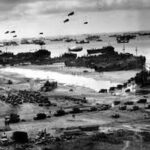Today, June 6, 2025, marks the 81st anniversary of D-DAY.
Over 10,000 troops were killed, injured, or went missing that first day. It’s been noted as one of the deadliest single days of the 20th century. That number only accounts for Allied forces, if you include total loss of life, the figure climbs even higher.
D-DAY was a major turning point in World War II. It opened the way for Allied forces to push into occupied Europe and ultimately win the war.
What made it successful wasn’t just the sheer force of over 135,000 troops landing, it was also the creative, bold, and often bizarre tactics that helped tip the scales. Below, we’re listing some little-known stories that played a part in the Allied victory.
1. The Ghost Army Nobody Talks About
They didn’t carry rifles. They carried paintbrushes, sound reels, and inflatable tanks. The 1,100 men of the “Ghost Army” created entire fake divisions to trick the Nazis into thinking the real invasion would hit somewhere else. They blasted recorded tank noise at night, mimicked radio chatter, and moved blow-up artillery around like stagehands. And the Germans? They bought the illusion, hook, line, and Panzer.
2. Operation Titanic: The Army of Rubber Corpses
In the black hours before D-Day, British planes dropped dozens of parachuting mannequins,”Ruperts”, into fields far from the real landing zones. They were stuffed with firecrackers and speakers, made to simulate gunfire and troop movement. Nazis wasted precious ammo shooting rubber. Somewhere out there, a German officer likely bragged about gunning down a whole platoon of dummies. Literally.
3. The Black Medic Who Saved D-Day and Got Buried by History
Waverly Woodson Jr. was a U.S. Army medic who landed on Omaha Beach and, while bleeding from his own injuries, pulled at least 200 men from death’s grip. Some say he should’ve had a Medal of Honor. But in 1944 America, a Black hero in the spotlight wasn’t convenient. He got a Bronze Star and a pat on the back. History nearly forgot him. We won’t.
4. The Madman With the Bagpipes
Bullets tore the sand apart, and amidst it all, one man Bill Millin marched up and down Sword Beach in a kilt, playing the bagpipes. His commander told him to play. The Germans didn’t shoot him not because they respected him, but because they thought he was insane. Turns out, they were right… and that madness inspired every man behind him to keep pushing forward.
5. The Frenchman Who Came Home With a Knife
177 Free French commandos landed with the British on Sword Beach. One of them didn’t stop until he reached the village he grew up in occupied and crawling with Nazis. He didn’t have a gun. Just a knife, a uniform, and a score to settle. And he settled it. House by house. Street by street. He liberated his hometown with bare hands and fury.
6. The Pitch That Killed a Machine Gun Nest
Some American soldiers were trained to throw grenades like baseballs. One of them lobbed a perfect curveball into a German machine gun nest that had pinned down his unit. They say he played semi-pro back home. That night, he played for his life—and won. No one remembers his name, but every man who lived that day remembers his arm.
7. The Radar Blackout That Opened the Gate
Hours before the invasion, Allied planes and commandos took out German radar installations all along the French coast. Some were bombed. Others were sabotaged on foot. The remaining few were jammed with so much noise they might as well have been deaf. When the armada arrived, the Nazis were blind. D-Day didn’t start on the beaches. It started in the static.
8. The Bird That Beat the News Wire
Gustav wasn’t a soldier. He was a pigeon. One of many carrier pigeons released with critical info from the front. Gustav flew 150 miles through storm winds and enemy fire to deliver the first D-Day report to England—hours before radio silence lifted. No medals, no headlines. Just feathers and instinct. But if you read the very first line that ever described D-Day? That was him.
9. The Hero With No Gun
They dropped with rifles. He dropped with a medic’s kit. Unarmed and under fire, chaplains and medics like Father Francis Sampson ran straight into hell, pulling bodies from the surf and giving last rites in between bursts of machine gun fire. Sampson was the real-life inspiration for the priest in Saving Private Ryan. He didn’t carry a weapon. Just hope.
10. The Weather Call That Saved the War
The invasion was supposed to happen June 5th. But one man James Stagg, a Scottish meteorologist predicted a storm that others missed. He told Eisenhower to delay by one day. The Allies listened. June 6th opened with just enough of a break in the weather. If they hadn’t waited, those landing crafts would’ve been kindling and corpses. That forecast might’ve saved Western civilization.
11. The Dog They Couldn’t Court-Martial
War isn’t made for dogs, but that didn’t stop a few soldiers from sneaking them in. One pup, smuggled ashore in a duffel bag, kept morale high and barked only at Germans. They tried to court-martial the soldier for unauthorized personnel. But the brass couldn’t bring themselves to punish him after the dog reportedly sniffed out a sniper nest days later. Good boy.
12. The Priest Who Walked Through Gunfire
Father Francis Sampson wasn’t just a chaplain he was a force of calm in chaos. He landed with the 101st, dodged bullets, and gave last rites with a whisper and a hand on the chest. At one point, he was captured, then let go by a German who couldn’t bring himself to kill a man of God. Some stories don’t need fanfare. They just need to be remembered.
13. The Canadian Who Took a General Prisoner
Major David Currie, a Canadian with a steel jaw and zero patience, cornered 100+ Germans including a general using nothing but grit and a tiny force in a small French town. He stood in the street calmly directing tanks like a traffic cop while bullets ripped through buildings around him. They gave him the Victoria Cross. He earned it in a single afternoon.
14. The Paratrooper Who Disappeared Into the Earth
One paratrooper went missing on D-Day. For decades, he was just a name. Then, years later, a farmer found a skeleton tangled in parachute cords buried under a hedgerow, gear still on, rifle still in hand. Turns out, he never made it out of the trees. The war kept moving. He stayed there. Forgotten by war. Remembered by accident.
15. The Code Hidden in a Poem
Two lines of a French poem broadcasted on the BBC told the Resistance everything they needed to know. “The long sobs of the violins of autumn…” went out on June 5th. The second line, even more obscure, signaled go time. Sabotage crews hit rails and lines across France. All of it hidden in a poem only spies could decode. The war spoke in whispers.








